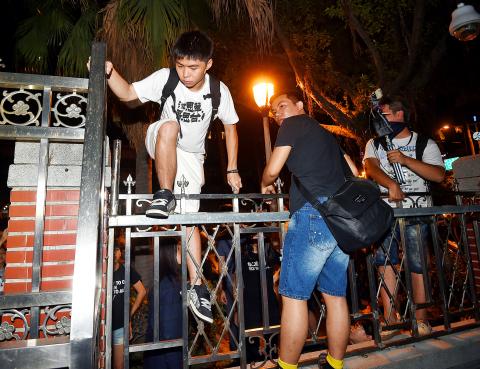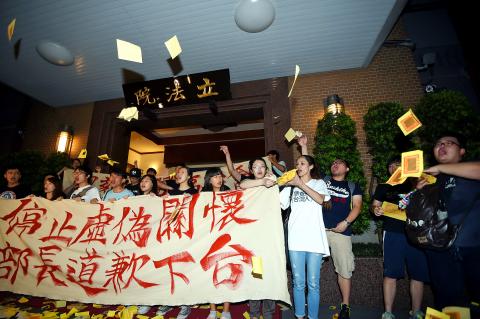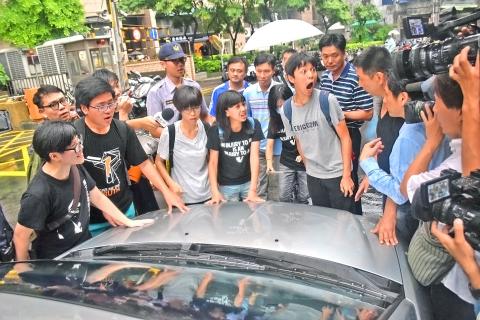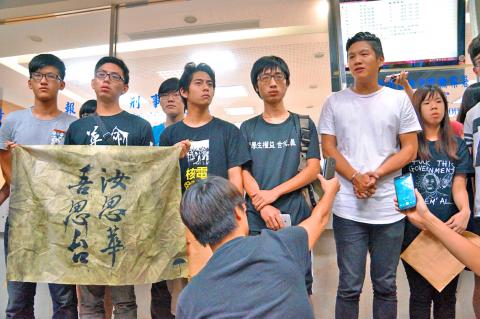Nearly 100 students protesting against high-school curriculum guideline changes who were gathered in front of the Ministry of Education suddenly charged onto the premises of Legislative Yuan nearby by climbing over the wall and fences at about 10pm yesterday.
Throwing “ghost money” in the air as they assembled at the front entrance inside the legislative compound, the students chanted: “The party state killers are great! [Minister of Education] Wu Se-hwa (吳思華) is a murderer! Convene an extra session now for legislators to abolish curriculum [changes] via vote!”
As of press time at midnight last night, the police, on alert at the nearby Ministry of Education building, had not made any moves concerning the students at the Legislative Yuan, resulting in an apparent standoff.

Photo: Fang Pin-chao, Taipei Times
The students stated their intent to fulfill the birthday wishes of Dai Lin (林冠華), the student protester who had apparently committed suicide.
Earlier yesterday, angry student activists confronted Wu, accusing him of being a “murderer” and demanding his resignation after the minister emerged from the apartment complex housing the family of Lin (林冠華).
Lin had played a leading role in student protests against the education ministry’s controversial adjustments to high-school curriculum guidelines that critics say reflect a “China-centric” view.

Photo: Fang Pin-chao, Taipei Times
Wu met Lin’s family members for half an hour before emerging to host a press conference with Lin Shu-kuei (林淑貴), the principal of New Taipei Municipal Juang Jing Vocational High School, which Lin had attended.
Following the press conference, activists again confronted Wu over the ministry’s refusal to drop the new guidelines — which are scheduled to take effect tomorrow — criticizing his handling of the controversy and demanding his resignation.
“I’ve been protesting against the guidelines for three months — why haven’t you come out? Why have I only seen you today?” Northern Taiwan Anti-Curriculum Changes Alliance spokesman Wang Pin-chen (王品蓁) asked, choking up with tears.

Photo: Chien Li-chung, Taipei Times
In response to student demands that the guidelines be dropped, Wu reiterated the ministry’s position that it would not interfere with school teachers’ choice of textbooks, with teachers free to choose older textbooks drafted before the implementation of the adjusted guidelines.
His remarks sparked cries of “lies” from the activists, who yelled for the “minister murderer” to “face the music” as he was hustled away by bodyguards.
Three men in plainclothes pushed a student to the ground, prompting other students to chase them to their car, demanding that they reveal their identity. The students then surrounded the car to stop the men from leaving, blockading the vehicle until police officers arrived and shoved them aside, allowing the car to leave.

Photo: Chien Li-chung, Taipei Times
In response to media queries, Wu said he was willing to take “full responsibility” for all of the controversy sparked by the curriculum guidelines.
When asked what “full responsibility” meant, he said he would make an “appropriate statement.”
He expressed “regret” at Dai Lin’s death, while ruling out withdrawing the new curriculum guidelines.
When asked whether the ministry would drop charges against the student activists who broke into the ministry building with Lin last week, he said that the ministry would show the “greatest possible legal goodwill.”
By evening a crowd of close to 100 had gathered outside of the ministry compound, lighting candles and placing posters on the surrounding razor wire barricades featuring a ghost-like picture of Wu, wishing the minister “sweet dreams.”
Independent music promoter-turned-activist organizer Yao Ken-hsiang (姚茛翔) said that Wu’s “cold-bloodedness” and “shamelessness” were “unassailable.” Given that Wu was totally “unfeeling” regarding Lin’s death, the most activists could do was wish him a “good night sleep” without running into Lin in his dreams, he said.
Separately yesterday, President Ma Ying-jeou (馬英九) said he felt profound grief upon learning that Lin was found dead, adding that the ministry should hold talks with students who oppose the curriculum changes.
There should be a balance between support for the freedom of speech and a society ruled by law in the exchange of ideas, Ma said.
Premier Mao Chi-kuo (毛治國) was quoted by Executive Yuan spokesperson Sun Lih-chyun (孫立群) as saying he was “extremely grief-stricken” after hearing about Lin’s death and immediately asked Wu to provide necessary assistance to the student’s family.
Mao said that young people who are still learning and growing need the support and assistance of their families, schools, the government and society on many aspects, including their daily and mental lives.
As the social atmosphere and public issues nowadays might be exerting great stress on young people, the family and the school should offer them strength and support and “not have them bear unnecessary pressure,” Sun quoted Mao as saying.
Additional reporting by Alison Hsiao and CNA

SECURITY: As China is ‘reshaping’ Hong Kong’s population, Taiwan must raise the eligibility threshold for applications from Hong Kongers, Chiu Chui-cheng said When Hong Kong and Macau citizens apply for residency in Taiwan, it would be under a new category that includes a “national security observation period,” Mainland Affairs Council (MAC) Minister Chiu Chui-cheng (邱垂正) said yesterday. President William Lai (賴清德) on March 13 announced 17 strategies to counter China’s aggression toward Taiwan, including incorporating national security considerations into the review process for residency applications from Hong Kong and Macau citizens. The situation in Hong Kong is constantly changing, Chiu said to media yesterday on the sidelines of the Taipei Technology Run hosted by the Taipei Neihu Technology Park Development Association. With

CARROT AND STICK: While unrelenting in its military threats, China attracted nearly 40,000 Taiwanese to over 400 business events last year Nearly 40,000 Taiwanese last year joined industry events in China, such as conferences and trade fairs, supported by the Chinese government, a study showed yesterday, as Beijing ramps up a charm offensive toward Taipei alongside military pressure. China has long taken a carrot-and-stick approach to Taiwan, threatening it with the prospect of military action while reaching out to those it believes are amenable to Beijing’s point of view. Taiwanese security officials are wary of what they see as Beijing’s influence campaigns to sway public opinion after Taipei and Beijing gradually resumed travel links halted by the COVID-19 pandemic, but the scale of

A US Marine Corps regiment equipped with Naval Strike Missiles (NSM) is set to participate in the upcoming Balikatan 25 exercise in the Luzon Strait, marking the system’s first-ever deployment in the Philippines. US and Philippine officials have separately confirmed that the Navy Marine Expeditionary Ship Interdiction System (NMESIS) — the mobile launch platform for the Naval Strike Missile — would take part in the joint exercise. The missiles are being deployed to “a strategic first island chain chokepoint” in the waters between Taiwan proper and the Philippines, US-based Naval News reported. “The Luzon Strait and Bashi Channel represent a critical access

Pope Francis is be laid to rest on Saturday after lying in state for three days in St Peter’s Basilica, where the faithful are expected to flock to pay their respects to history’s first Latin American pontiff. The cardinals met yesterday in the Vatican’s synod hall to chart the next steps before a conclave begins to choose Francis’ successor, as condolences poured in from around the world. According to current norms, the conclave must begin between May 5 and 10. The cardinals set the funeral for Saturday at 10am in St Peter’s Square, to be celebrated by the dean of the College